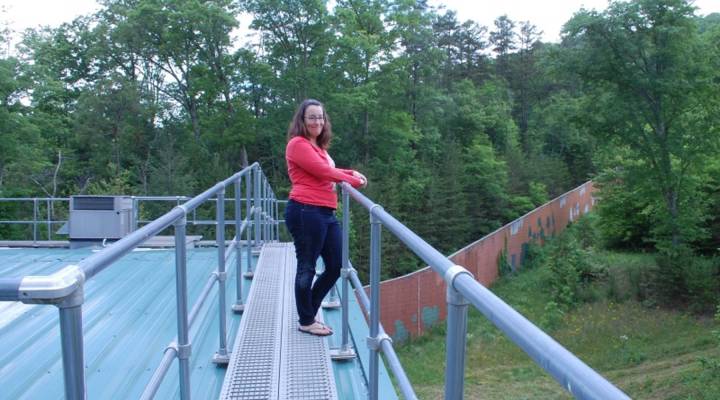
For chimps no longer needed for research, smoothies and sanctuary
For chimps no longer needed for research, smoothies and sanctuary

Sarah Baeckler Davis shows off the 200 acres of green hills in North Georgia where she recently started a sanctuary to house chimpanzees. On a tour before it opened, she pointed out the clinic, a series of primate villas, and then she led the way to the building with the kitchen.
“Back there is the chimp smoothie bar,” said Baeckler Davis, gesturing toward a series of blenders sitting on a counter.
Chimps won’t be able to sit there, but they can watch what’s being made through a window. Baeckler Davis said her team at the sanctuary will be working with mostly whole foods and fresh fruit. The chimps will likely have smoothies for breakfast.
Caring for chimps has been Baeckler Davis’ life’s work. She’s run a sanctuary for chimps before in Washington state. And she hadn’t actually planned on starting another one, but then she met 220 chimps at a lab in Louisiana, the New Iberia Research Center.
“After having gone to New Iberia, I just I couldn’t not do it,” Baeckler Davis said. “I looked into the eyes of those chimps there and there was no way I would be able to live with myself if I didn’t at least try” to give them a home.

The North Georgia sanctuary includes an open green space, enclosed by a cement wall.
When the National Institutes of Health quit funding biomedical testing on chimpanzees last year, that put most research chimps out of work. Many of the primates are owned by NIH, and federal law promises them a spot in a sanctuary.
But there are around 300 other chimps at private research centers, including the group at New Iberia, that are considered “privately owned” and were left with no retirement plans.
They could stay in labs. Some have gone to zoo exhibits. Behaviorist Steve Ross of Chicago’s Lincoln Park Zoo has coordinated chimp transfers.
“There’s quite a few chimpanzees in zoos that come from labs,” Ross said. “So I think zoos are able to play more and more of a sanctuary role.”
Zoos and labs don’t count as retirement, though, to some animal welfare advocates. Rachel Weiss, a former lab worker, who now lives in Louisville, Kentucky, said labs and zoos are built for people, not the primates.
“Chimps who have been living in laboratories for their whole life,” Weiss said. “They deserve more than that. Letting them have lives of their own is only possible in sanctuaries.”
There just hasn’t been room for all of the private chimps. The eight or so existing sanctuaries are basically full. With her new North Georgia sanctuary, called Project Chimps, Baeckler Davis is taking most of the chimps and hopes space won’t be an issue any more.
“We’re building fat,” Baeckler Davis said, “so that we can ideally take in anyone else who needs somewhere to go.”
It won’t be cheap to accept them all. Baeckler Davis said it costs $20,000 per year to care for a single chimp. She’s relying on private donors.
There’s a lot happening in the world. Through it all, Marketplace is here for you.
You rely on Marketplace to break down the world’s events and tell you how it affects you in a fact-based, approachable way. We rely on your financial support to keep making that possible.
Your donation today powers the independent journalism that you rely on. For just $5/month, you can help sustain Marketplace so we can keep reporting on the things that matter to you.












